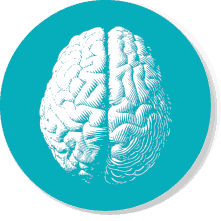

Scientific discoveries are starting to confirm that the human body is truly a network of intercommunicating systems, in which mental process, emotions, and physiological systems are all intricately intertwined. This has always been the basis of Chinese medicine, Ayurveda from India, and naturopathic medicine. However, for the rest of us in the Western world, the idea of the gut and the heart having something to do with our actual brain and its many control functions is a lot to get your head around, so to speak. Yet, new research is showing that gut microbes influence both the heart and the brain; and the heart, in turn, also influences brain function.
The GUT-Brain Connection
To understand this, we need a refresher on the newly understood role of microbes in the gut. When the microbe population is out of balance, with “bad” bacteria outnumbering “good” bacteria, we see “leaky gut” – an increased permeability of the intestinal membranes, causing both local and systemic inflammation. This inflammatory response contributes to a number of neurological and mental health disorders including learning problems, anxiety, and depression, as well as cognitive and memory problems such as dementias. Recently, a research team found that just one episode of systemic inflammation could be enough to trigger a more rapid decline in neurological function. One of the many causes of imbalances in the gut microbiome is stress and the hormones related to it. Research has also shown that stress hormones cause imbalance in the gut microbiome and imbalances in the gut microbiota also cause an increase in stress hormones.
It’s a two-way communication network. But when the gut is recolonized with healthy gut bacteria (with the help of probiotics), the stress response normalizes and leads to a decrease in stress hormone production. The importance of a balanced gut microbiome in brain health becomes clear through animal research, which has revealed that just seven days of injections with stress hormones caused amyloid proteins in the brain to increase by 60%. Amyloid proteins are believed to be a key factor in cognitive decline and dementias, including Alzheimer’s.
The HEART-Brain Connection
The condition of the gut microbiome also has an effect on the heart, which can also influence the brain. We already know that hypertension (high blood pressure) damages structures in the brain. People with untreated hypertension have shown accelerated brain aging, decreased cognitive function, and increased risk for vascular dementia. Nonetheless, probiotics have been shown to be helpful to the heart, which also helps the brain. A meta-analysis based on 14 randomized, placebo-controlled, clinical trials has found that probiotics and probiotic-rich fermented foods significantly reduced blood pressure in hypertensive subjects. In other words, these findings suggest that lowering blood pressure with the help of probiotics is very promising for improving cardiovascular health as well as brain health. Normalizing the gut microbiome with probiotics is indeed good for both head and heart!

What Can We Do to help Our Three Brains?
There are a variety of brain-supporting dietary ingredients which, together, support the three interactive communication centers – the gut, the heart, and the brain. But who wants to be purchasing that many products or devote an entire shelf to them? Instead, I recommend getting the best, the most economical, and the easiest to administer nutritional support with 3 Brains Totalt from Natural Factors.
The 3 Brains Total kit features and benefits:
- Provides 30 daily packets, each containing foundational nutritional support for each of the three brains. It is cost-effective and efficient.
- It is convenient and ready when you are. Just throw it in your pocket or carry a few packets in your car or purse.
- This combination of supporitve nutrients takes the guesswork out of what to take and how much.
- When compared to purchasing ingredients individually. The 3 Brains Total kit is a great value.

Nutrients for the three brains:
Probiotics – for the support of mental, cardiovascular, and gastointestinal health.
Phosphatidylserin (PS) – to support mood and memory.
Curcumin – to support healthy inflammatory responses, which is key for brain, heart, and gut health.
Omega-3 fatty acids – to support a healthy mood, memory, learning, and cognition.
Grapeseed extract – counteracts cellular and DNA damage due to free radicals. This supports heart and memory health.
ADDITIONAL lifestyle tips for supporting your three brains:

Drinking water is essential for supporting your opt9imal three brain function.
It prevents dehydration, increases blood circulation, and aids in the removal of toxins. Dehydration can lead to inflammation, fatigue, dizziness, poor concentration, and reduced cognitive abilities. Even mild levels of dehydration affect mental performance.
Choose foods from the Mediterranean diet.
New research suggest that the Mediterranean die3t – high in vegetables, low in meat protein and carbohydrates, liberal use of good fats such as loive oil – may prevent brain atrophy and preserve cognition in the elderly.
Get your exercise!
Regular aerobic exercise not only prevents memory problems, but can actually help turn back the clock on brain aging. Moderate exercise in mid-life is associated with a 39% lower chance of developing cognitive impariment.
on brain aging. Moderate exercise in mid-life is associated with a 39% lower chance of developing cognitive impariment.
By using the ingredients and tips mentioned in this article you can know that day after day you’re providing your three brains the best possible nutritional support available! The 3 Brains Total kit can be found at local natural health stores.
For more information, visit 3brainshealth.com
References
Fabio S, Pimentaa FS, Luaces-Regueirab M, et al. Mechanisms of Action of Kefi r in Chronic Cardiovascular and Metabolic Diseases.
Cell Physiol Biochem. 2018; 48:1901-1914.
Jose PA, Raj D. Gut microbiota in hypertension. Curr Opin Nephrol Hypertens. 2015 Sep; 24(5):403-9.
Thushara RM, Gangadaran S, Solati Z, et al. Cardiovascular benefits of probiotics: a review of experimental and clinical studies.
Food Funct. 2016 Feb; 7(2):632-42.
Upadrasta A1, Madempudi RS1. Probiotics and blood pressure: current insights. Integr Blood Press Control. 2016 Feb 25; 9:33-42.












